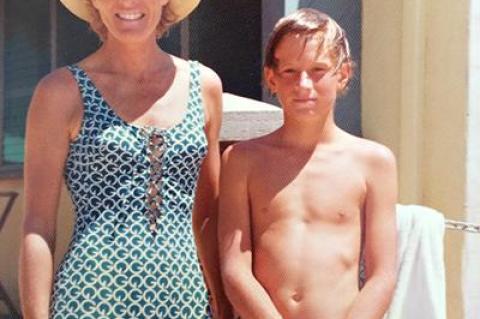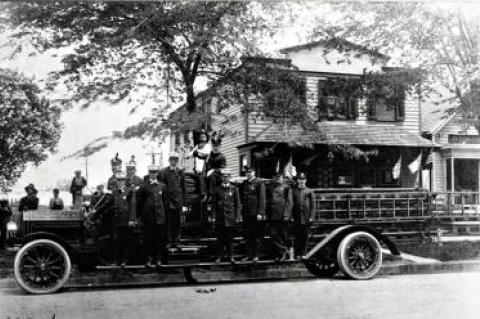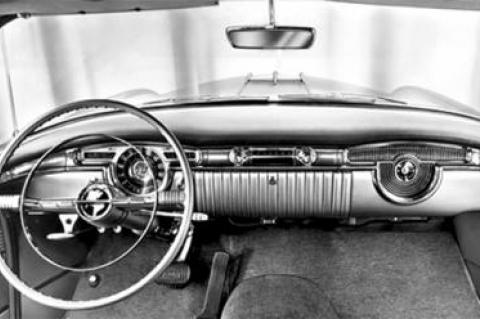I’m always a little embarrassed when procrastination pays off. I probably shouldn’t be, since I do it enough that the odds ought to provide a positive result once in a while. This time they did.
Guestwords
Friends, I thank you for starting another piece from me on this topic; please don’t move on yet. Yes, my efforts to defend Social Security from government and media lies have become familiar, though I fear fruitless, for more than a decade. Still, revelations in recent years of ever more skullduggery by both parties make my efforts even more relevant. Remember Bob Hope’s quip: “No one party can fool all the people all the time. That’s why we have two parties.”
 Swimming With Mom
Swimming With MomI’m on the phone with my sister Tish, driving south through a blizzard in western Massachusetts to catch a plane to South Carolina. Mom, a New Yorker, moved there six years ago for the final chapter of her life. She’s stopped eating and drinking.
 Roll on, Ye Olde Firetrucks, by Jeff Nichols
Roll on, Ye Olde Firetrucks, by Jeff NicholsTo be candid, I walked into the Southampton Antique Firehouse (yes, there is one, and it is fully functional) with a singleness of purpose: to sell them a comedy show.
“The Duke makes me puke” is what I said to Ben, my 90-year-old stepfather, about his idol, the film star John Wayne, a.k.a. The Duke. Words I can never take back but will take to my grave.
This political season the pundits failed to predict that the nonestablishment candidates, Donald Trump and Bernie Sanders, would do so well. The pundits deluded themselves into thinking that voters would overwhelmingly stick with establishment candidates, timeworn ideologies, and business-as-usual initiatives. To date, the opposite is true.
Standing on top of rubble — cement blocks, slabs of wood, a pile of bricks, shingles, and mounds of dirt — I could hardly believe my eyes. What used to be my family’s home of 55 years, on the 10th hole of the Montauk Downs golf course, was now completely gone except for the two-car garage at one end and one small remaining wall of the bathroom at the other.
 A Tidy Tale of Litter, by Bruce Buschel
A Tidy Tale of Litter, by Bruce BuschelYour cat needs litter. It’s Saturday night and your usual outlet is closed until Monday, so you go to King Kullen. You better hurry. King Kullen closes at midnight on Saturdays, unlike the rest of the week when it’s open round the clock. You’d like to think that Bridgehampton is the only village in America that can support a Starbucks, a Gap, a T.J. Maxx, a Kmart, a 24-hour supermarket but can’t get mail delivered by the United States Postal Service.
How did we meet? I’ll tell you. I was working at the radio station WEHM as a D.J. with a Saturday afternoon show, “Kyle on the Dial.” Rusty listened all the time and fell in love with my voice. Curious as he was, he called the station.
It troubles me that the East Hampton Town Board has bowed to the Wainscott School Board’s demands and quashed the proposal to build affordable apartments off Stephen Hand’s Path for 48 of the town’s low-income working families.
If the Rev. Dr. Martin Luther King were alive today and he had to endorse a candidate for president of the United States, who would that be? M.L.K. believed there were three evils that would destroy America: war, racism, and poverty. Let’s unpack poverty for a moment.
Once there was a woman who wanted to be a children’s writer, so she went to seek advice from the wisest counselor in the land.
I was late coming to Stephen Sondheim — 1979. I was 31 years old, and now I can’t remember why but I got two tickets to “Sweeney Todd.” This was after “Gypsy” and “Follies” and “Company.” It was 25 years or more after “West Side Story.” “Send In the Clowns” was also behind him, recordings by many voices, including the Voice himself.
A late Sondheim bloomer.
Christmas can be a time to evaluate our collective “goodness.” We mourn profusely the loss of 14 Americans in the San Bernardino shootings but do not feel connected with the hundreds of thousands of lives lost abroad.
Speaking at the recent climate talks in Paris, President Obama declaimed that “necessity is the mother of invention,” and back in March, Israel’s prime minister famously told Congress about Iran that “the enemy of your enemy is your enemy.” Punditry is alive and kicking.
 Albert Einstein, Rock Star
Albert Einstein, Rock StarA New York Times headline on Nov. 10, 1919, read: “Lights All Askew in the Heavens: Men of Science More or Less Agog Over Results of Eclipse Observations. Einstein Theory Triumphs: Stars Not Where They Seemed or Were Calculated to Be, but Nobody Need Worry.”
When I give tours to children and adults at the Parrish Art Museum, I always tell them, “Touch with your eyes, not with your hands.” So when I visited the Henry Moore Foundation at Perry Green in Much Hadham, England, I was in for a surprise.
I don’t play tennis. I don’t golf. I burn easily. Even with a hat and an S.P.F. of 30 on my face and my surfeit of sunglasses, still I freckle and burn. And mosquitoes always make a beeline to my elbows and ankles.
 DW/OS: Driving Without Siri
DW/OS: Driving Without SiriI am sitting in my car waiting for the Quogue courthouse to open when I see this on my mobile phone: “Results of a study by AAA indicate that motorists using hands-free technologies in their cars could miss stop signs, pedestrians, and other vehicles while the mind is readjusting to the task of driving. Drivers can be distracted for 27 seconds after changing music or dialing a phone number.”
It seemed like a good idea at the time. Newly (and consciously) coupled, we needed to be comfortable driving each other’s cars. What better plan than to drive the vehicles to the car wash, followed by a leisurely lunch at Southampton’s Sant Ambroeus?
There’s no doubt formality has gone the way of the typewriter, and I have to tell you, I’m sorry to see it go. I write that with the humbleness of one who has flouted convention along with every other flower child and anarchist dating back to 1968. To say I’m not a prude is to put it mildly. I lust after sexy entertainment, have been known to shout out a vulgarity or two, and like to ride fast roller coasters.
Make no mistake, you are living through a U.S. version of the Bolshevik Revolution.
This year there have been a number of fish kills and harmful algal blooms in the Peconics and Shinnecock Bay. In my previous “Guestwords” column, I discussed how these events were caused by excessive nutrients (primarily nitrogen) coming mostly from fertilizers running off from farms and lawns, and from human waste, coming in primarily in groundwater from septic tanks.
The Hamptons are among the nation’s most gorgeous locales. The women living and vacationing here are equal to the landscape. Simply stunning. Enhanced bodies, refigured faces, doesn’t matter. Walk the Hamptons villages: short dresses barely there, hems touching slim upper thighs, feet with manicured toes peeping from pricey sandals with six-inch heels. Bodies to die for. And that’s just for starters.
Once upon a time there were three safecrackers named Cal, Earl, and Gus. For a long time they had schemed to rob the biggest house in town, which was said to have a safe containing huge quantities of diamonds.
At 8 in the morning, the day’s heat was already rising as I walked toward a funeral service I hoped to attend. It was the last Saturday in June in my adopted hometown of Charleston, S.C., and a long line of mourners had been forming for hours near a stadium in the middle of the city.
While it is arguably the best time to be on the East End, with the sun still shining brightly and the local farms bursting with their harvest, our attention begins to refocus away from the joys of a glorious summer.
Stella Goldschlag was a German Jew from the Berlin provinces who worked with the Gestapo during World War II, identifying Jews stuck in Berlin who were masquerading as Aryans. Those German Jews who performed this betrayal service for the Nazis were called “catchers.”
You’re not the only one with a summer rental, reads the sign in the window of the J. Crew on Main Street in East Hampton. The store is currently undergoing renovation and the sign is merely meant to direct customers to J. Crew’s “rental,” a pop-up shop just across the way, but when I came upon it the other night all brightly lit, it nearly stopped me dead in my flip-flops.
It is the early fall of 2016. The so-called Iranian nuclear nonproliferation pact is diplomatic history, although accusations of clandestine Iranian noncompliance are rampant.
